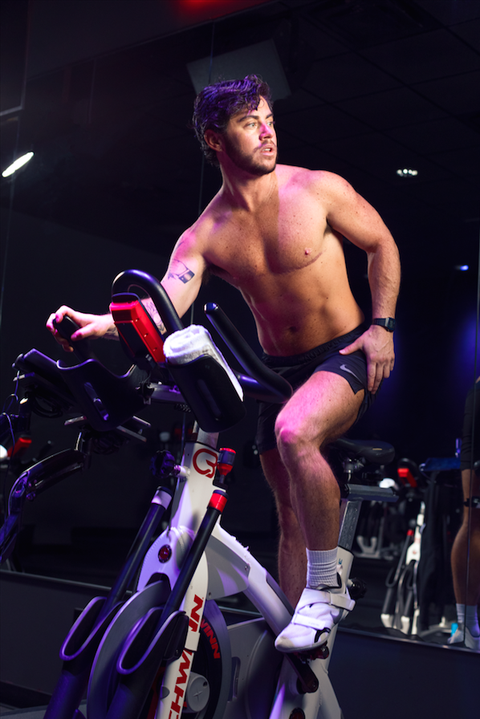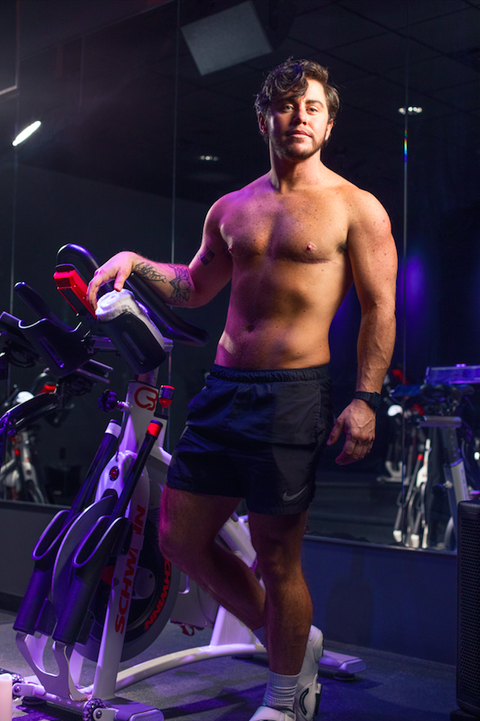
Max Rigano, a spin instructor with CycleBar, tells Men’s Health how rediscovering a love of fitness was an integral part of his transition journey.
I knew from an early age that I was different. I dressed like a boy when I was little, and I would tell people I was a boy. But I grew up in the Midwest, and there weren’t a lot of trans people living openly back then, so I spent years unable to fully make sense of my gender, feeling like I didn’t quite fit into my body.
I realized I was trans when I was 29, just over two years ago. I was watching a documentary, and they sort of plainly put the definition out on the table, and I guess I was finally in the right place mentally and emotionally to receive that, and recognize that this was what I’d been going through my whole life.
I’d always been quite athletic, and loved sports, but I definitely felt a very deep apathy towards my own health at one time. I can’t help but look back and think I was depressed and not myself when I was living as a woman; I could not see ahead of me, I didn’t know what I wanted to do with my life, and that contributed to a lack of self-care. Transitioning helped me see who I could be, and made me feel like I had a second chance, to be my full self. I definitely started caring for my body in a new way, and became a lot more invested in my health.
Since transitioning, fitness has become a huge part of my life. I think for a lot of trans men, they want to achieve this masculine physique. I’m certainly not above that, it’s a wonderful part of being on testosterone and working out, but it’s deeper than that. I’ve leaned into the person I’ve always been, and that’s an active person who really cares about their health, and not just in the physical realm. I go to therapy, I try to maintain relationships that are important to me, I read a lot. Fitness has been a huge part of coming to value myself.

Around the same time, spin came into my life. On the same day that I came out publicly, I went to a spin class with my coworkers, and I just had this intense connection with it, and with the instructor. I called my partner and was like, “Can you believe someone gets to do this? They’re just like an athlete, a DJ, and a pastor.” As soon as I was able to do cardio after getting my top surgery, I went to a class, and I’ve pretty much cycled every single day of my life since then.
Riding at CycleBar has kind of gone hand-in-hand with my transition. At first, I was always wondering, is this computer reading my gender, is it being fair, because I don’t have as much testosterone as the next guy, I’m not as tall, etc. I’m competitive to the core, which made me work harder, because even if I’m at a disadvantage, I still want to win. And eight months in, I started beating these guys who always won. I kept winning, and I remember thinking I didn’t want them to be mad at me. And then one day I beat this guy, and he came up to me afterwards and said “Max, you are getting so strong.” I just remember being afraid that men in the community would be threatened by this little 5’5 guy beating them, but it was a game-changer for me, for this super strong life-long cyclist to notice that I had finally beaten him, and he was so encouraging.

In general, I was pretty afraid when I started going to CycleBar because I was not passing as a man yet, I hadn’t had top surgery the first few times, and I was too nervous to specify my pronouns or draw any attention to myself. But the whole environment was really inclusive, and then as I became more active in that community on Instagram, people got to know me, and I felt really embraced, so it felt almost inevitable that I would train as an instructor myself, which I did six months ago. I’m now friends with all of the instructors, and really involved in the community, and it’s not just that people are “tolerant”; they really lift up my story.

When I’m not teaching, I will often ride in classes shirtless. When I started, there were all these super in-shape guys who would take their shirts off and no-one had an issue; the instructor would joke that it was like a Chippendales show. And after I got top surgery, over the next year as I was healing, I started using that space to experiment with the feeling of what it was like to have my shirt off in public. Riding shirtless has kind of become my power, it’s my way of saying you don’t have to have a conventional body to be here. Because we all belong here.
Now, a year later, people will say “I had no idea you were trans,” which isn’t necessarily a compliment to every trans person. Being visibly trans is extremely important to me. I know I’m a trans person with a lot of privilege; I’m white, I’m passing, at the end of the day I am riding in a boutique fitness studio. I don’t see a lot of my community there, and I want to. There are trans men who ride here now, and that’s amazing.
The owner of my studio is extremely proud to have hired the first out trans instructor with CycleBar, and now I’m looking to find more openly trans fitness instructors. I feel really lucky. I’m just glad that my own self-doubt didn’t get in the way of being able to accomplish that.
Source: Read Full Article